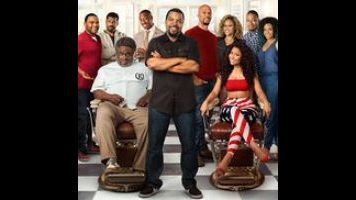The Next Cut revives the warm familiarity of Barbershop

The last few years have seen plenty of sequels trailing their predecessors by over a decade. This is undeniably the case with Barbershop: The Next Cut; it’s separated from the second Barbershop by 12 years and from the original film by almost 14. But despite the passage of time, the influx of new characters, and the fact that formerly young-ish barbershop proprietor Calvin (Ice Cube) is now parenting a teenage son, The Next Cut doesn’t really feel like a years-later follow-up. Maybe it’s because most of the actors who do return, including Cube, rapper Eve, and a reduced-role Sean Patrick Thomas, have barely appeared to age since 2004, or maybe it’s because Cedric The Entertainer wears pretty much the same semi-unconvincing hair and makeup as he did playing a sixtysomething a dozen years ago, ignoring the fact that his character Eddie should have advanced even farther into old age by now.
It’s more likely, though, that The Next Cut doesn’t feel like a musty revival because it has such a simple, durable, comfortable premise: Calvin’s barbershop hosts a variety of conversational riffing and romantic entanglements while eventually facing some kind of threat to its South Side neighborhood in Chicago. After tackling foreclosure and gentrification, Calvin and company are now dealing with escalating gang violence in their beloved city, and whether or not it will ensnare Calvin’s son Jalen (Michael Rainey Jr.). At times, Calvin’s (and by extension, the movie’s) anger and frustration with neighborhood violence makes the film feel like a companion piece to Spike Lee’s recent Chi-Raq.
Of course, there’s plenty of workaday soap mixed into the social consciousness. The movie doesn’t really differentiate between bits of continuity from the previous films and the variety of events that have happened during the offscreen interim, such as Terri (Eve) marrying previously unseen Rashad (Common), and Calvin fusing his dude-heavy barbershop with a group of female stylists led by Angie (Regina Hall, arriving in the Barberverse sporting snazzy blue hair). Though some of this can be confusing for anyone with a hazy memory of the earlier films—including spin-off Beauty Shop—it also makes this the rare third-parter that’s fairly inviting for new viewers, never too beholden to its series past. New characters like Rashad, nerdy Jerrod (New Girl’s Lamorne Morris), flirtatious Draya (Nicki Minaj), and enterprising One-Stop (J.B. Smoove) get substantial screen time.
Morris and Smoove are particularly natural comic additions to the cast, underlining the best part about any Barbershop movie: watching a lot of funny, charming actors (and sometimes also rapper/actors) enjoy the opportunity to chat, philosophize, or even express political opinions—something a lot of studio comedies work strenuously to avoid. This time out, the characters hold court on Obama, American racism, Instagram sexuality, and gender roles, among other topics. Nothing anyone says is much edgier, more insightful, or more topical than the dialogue in any number of sitcoms (Black-ish creator Kenya Barris even worked on the script). But a movie theater, like a barbershop, is a communal space, and the clamorous conversation plays especially well to a crowd eager to spend time with a bunch of likable stars.
The movie would be even more welcoming if director Malcolm D. Lee made better use of the barbershop as a physical location; in a few scenes, the blocking is far more confusing than it should be for a set that only has three rooms. The outside-barbershop moments don’t fare any better, at least technically speaking; whenever the movie cuts to Calvin and his family at home, it feels as if the actors have been waiting there silently for their scene to start. The family stuff also drifts away from the movie’s ensemble strengths, but it’s a forgivable sort of neglect when Cube and company seem so determined to address and condemn real-world violence. Again, there are few groundbreaking insights offered. But as a borderline cornball but effective social-issue film, The Next Cut explicitly and smartly avoids the presentation of easy answers. The second half of the movie hinges on the barbershop gang staging a weekend cease-fire, and Calvin isn’t shy about wondering aloud whether that kind of peaceful protest can have any effects whatsoever—and if he ought to leave for more gentrified environs.
Though this series is built on comic looseness, it’s that sincerity that carries through its minor comedic missteps, like underusing Hall and leaning too heavily on Cedric’s wacky-old-man shtick. In about six hours spaced out over a decade and a half, the Barbershop movies have generated the warmth of a familiar TV show without the time demands of hundreds of episodes. The question isn’t why revive Barbershop after so many years, but rather, can Ice Cube do more of these and fewer Ride Alongs?